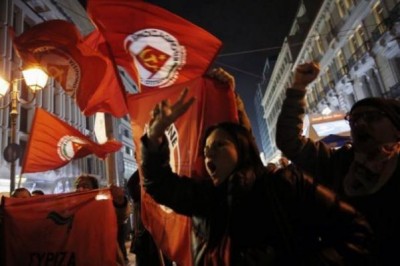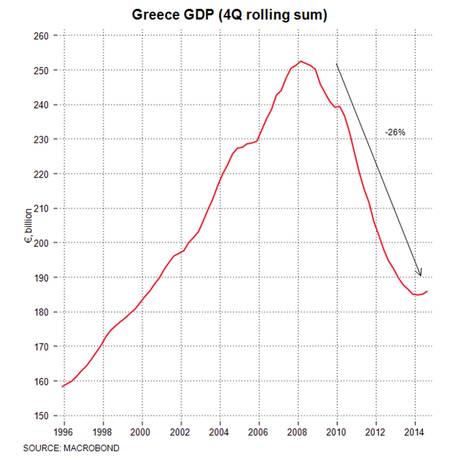U.S. Mainstream Media Warning Greece Against a Radical Leftist Break with Austerity
Improbable as it may seem to the Washington Post, Greek voters doubt austerity is required

The Washington Post illustrated the victory of Greece’s Syriza with a photo of marchers carrying the flag of an Italian neo-Communist party. Caption: “Leftist victory could put Athens at odds with the rest of Europe.” (photo: Petros Giannakouris/AP)
The Washington Post‘s Griff Witte (1/25/15) reported on the historic victory of the anti-austerity party Syriza, led by Alexis Tsipras, in the Greek elections on January 25:
Tsipras…had campaigned on an upbeat if improbable platform of reviving the country’s beaten-down economy by turning on the taps of government stimulus. He vowed to hire back laid-off workers, raise the minimum wage, expand access to health insurance and provide electricity to those who can no longer afford it.
Those pledges resonated powerfully in a nation where a third of the population lives at or below the poverty line, following years of cuts and recession. But the election of the first radical leftist government in the history of the European Union represents a provocative challenge to the international creditors who bailed out Greece to the tune of $284 billion on the condition that the country rein in its bloated costs.
Note the editorializing; Syriza’s anti-austerity platform is “improbable,” and who could be against reining in “bloated costs”?
Image, right: Greece’s “bailout” did nothing to arrest its freefall into depression. (graphic: The Independent, 1/26/15)
Warning Greece against a radical break with austerity has been a longstanding theme at theWashington Post; see “WaPo: Greece, Don’t Be an Argentina” (FAIR Blog, 11/4/11). It’s worth emphasizing, though, that the creditors who “bailed out Greece” in reality didn’t bail out anyone but themselves; economist Paul Krugman described the effects of the intervention by the IMF, the EU and the European Central Bank in his New York Times column (1/26/15):
Far from ending in 2011, the Greek recession gathered momentum. Greece didn’t hit the bottom until 2014, and by that point it had experienced a full-fledged depression, with overall unemployment rising to 28 percent and youth unemployment rising to almost 60 percent. And the recovery now underway, such as it is, is barely visible, offering no prospect of returning to precrisis living standards for the foreseeable future.
Witte ends his article with Greek economist George Pagoulatos warning that Syriza’s voters “are not ready to accept the kind of compromise that the situation requires.” Witte describes Pagoulatos as “a former government adviser,” but doesn’t note that the governments he advised presided over some of the worst economic performance in Greece’s history, from November 2011 to June 2012. Perhaps voters might be forgiven for being skeptical of the benefits of the kind of compromises that Pagoulatos thinks are required (Beat the Press, 1/25/15).
But Witte makes sure to inoculate his readers against sympathy with those voters with a hefty dose of red-baiting, describing “middle-class voters…casting their lot with a group dominated by Marxist university professors and Communist activists.” Here’s the Post reporter’s description of the victory celebration:
As the scale of the party’s victory became clear, thousands of people took to the streets of central Athens to cheer, dance, hug and sing along as revolutionary anthems blared from loudspeakers. Some hoisted banners emblazoned with the image of Latin American rebel Che Guevara. Hundreds of backers of an Italian neo-Communist party brandished their party’s flag, which features a hammer and sickle.
You wouldn’t know it from Witte’s article, but Greece does have an actual Communist Party of its own, the KKE, which won 5.5 percent of the vote and 15 seats in parliament. The KKE declines to join forces with Syriza, seeing that party as overly reformist (Jacobin, 1/21/15). But Witte doesn’t even mention the KKE when describing potential coalition partners, even while discussing–and dismissing–the possibility of an alliance with Golden Dawn, a neo-fascist party responsible for violent attacks on Syriza leaders.
Perhaps mentioning that there are political options to the left of Syriza would complicate Witte’s portrait of Syriza’s voters as uncompromising extremists who refuse to recognize that there is no alternative to austerity.


